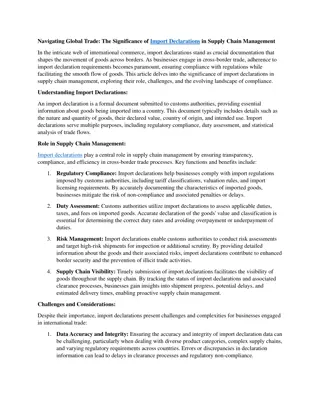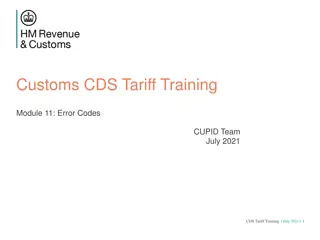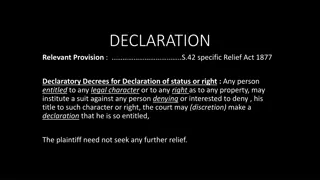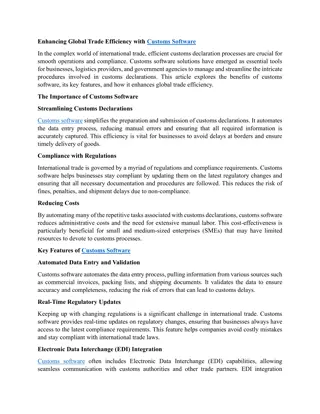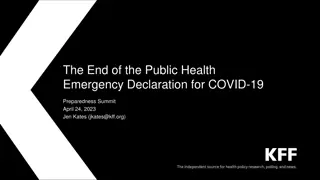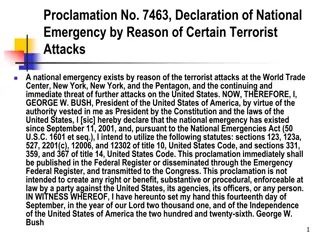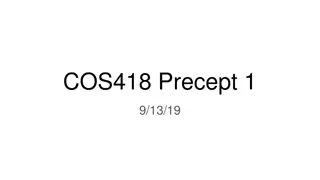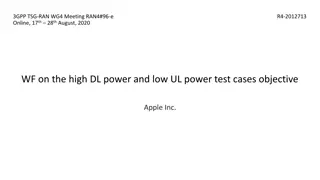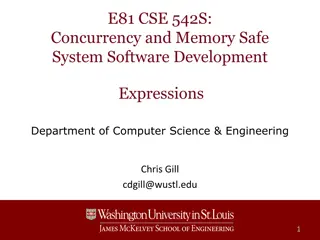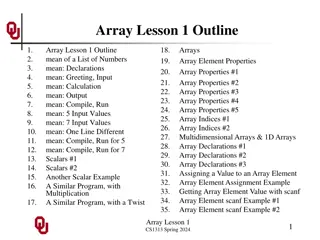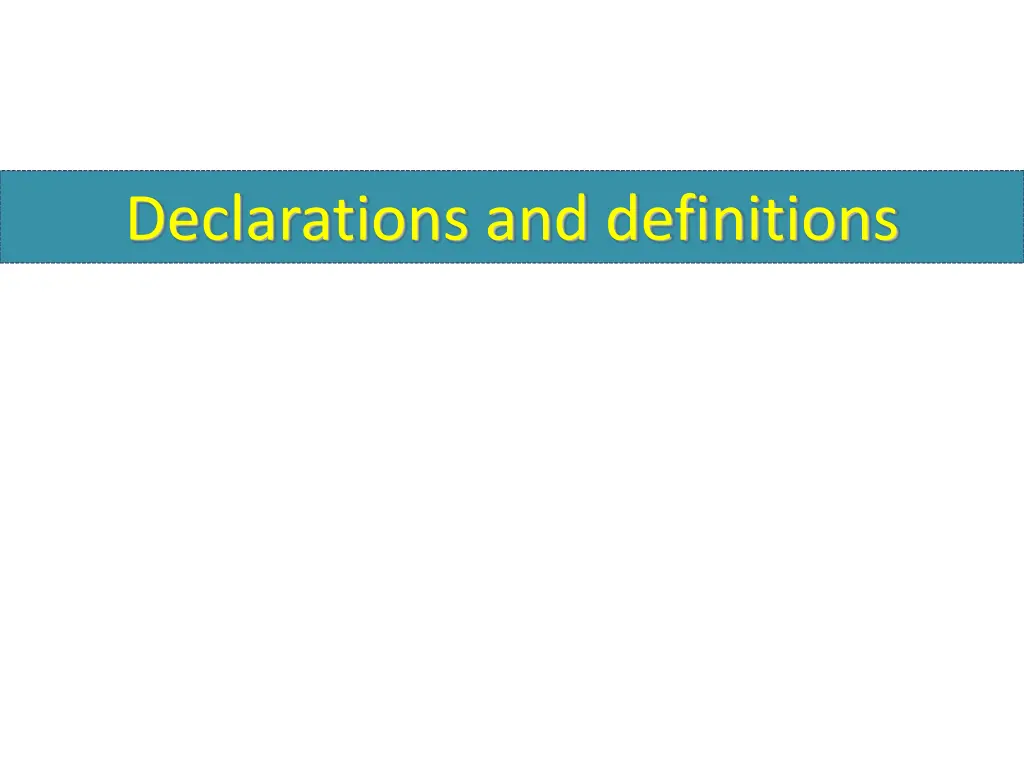
Understanding Declarations and Definitions in Programming
Explore the importance of declarations and definitions in programming, including their roles in ensuring code compilation and runtime generation, the one-definition rule, and strategies to prevent violation errors. Learn how ODR violations can lead to duplicate symbol errors and how to protect against them using proper include guards.
Download Presentation

Please find below an Image/Link to download the presentation.
The content on the website is provided AS IS for your information and personal use only. It may not be sold, licensed, or shared on other websites without obtaining consent from the author. If you encounter any issues during the download, it is possible that the publisher has removed the file from their server.
You are allowed to download the files provided on this website for personal or commercial use, subject to the condition that they are used lawfully. All files are the property of their respective owners.
The content on the website is provided AS IS for your information and personal use only. It may not be sold, licensed, or shared on other websites without obtaining consent from the author.
E N D
Presentation Transcript
Declarations and definitions Declaration A construct to declare the existence (of a class/variable/function/...) Identifier Some basic properties Ensures that (some) references to the identifier may be compiled Some references may require definition Definition A construct to completely define (a class/variable/function/...) Class contents, variable initialization, function implementation Ensures that the compiler may generate runtime representation Every definition is a declaration Declarations allow (limited) use of identifiers without definition Independent compilation of modules Solving cyclic dependences Minimizing the amount of code that requires (re-)compilation
Declarations and definitions One-definition rule #1: One translation unit... (module, i.e. one .cpp file and the .hpp files included from it) ... may contain at most one definition of any item One-definition rule #2: Program... (i.e. the .exe file including the linked .dll files) ... may contain at most one definition of a non-inline variable or function Definitions of classes, types, inline variables or inline functions may be contained more than once (due to inclusion of the same .hpp file in different modules) If these definitions are not identical, undefined behavior will occur Beware of version mismatch between headers and libraries Diagnostics is usually poor (by linker)
ODR #1 violation t.hpp class C { /* DEFINITION */ }; a.hpp #include "t.hpp" void af(C p); b.hpp Error: Duplicate class definition "C" Compiler #include "t.hpp" void bf(C q); m.cpp #include "a.hpp" #include "b.hpp" void z(C r) { af(r); bf(r); }
ODR #1 protection t.hpp #ifndef t_hpp_ #define t_hpp_ class C { /* DEFINITION */ }; #endif a.hpp #ifndef a_hpp_ #define a_hpp_ #include "t.hpp" void af(C p); #endif OK Compiler b.hpp #ifndef b_hpp_ #define b_hpp_ #include "t.hpp" void bf(C q); #endif m.cpp #include "a.hpp" #include "b.hpp" void z(C r) { af(r); bf(r); }
ODR #2 violation a.cpp a.obj #include "f.hpp" int main(int,char**) { return F(); } F(): 01010000 11010111 11010111 Compiler main: 11010111 01010000 11010111 export F(), main f.hpp #ifndef f_hpp #define f_hpp int F() { /* CODE */ } #endif Error: Duplicate symbol "F()" Linker b.obj b.cpp Compiler F(): 01010000 11010111 11010111 #include "f.hpp" export F()
ODR #2 protection a.cpp a.obj #include "f.hpp" int main(int,char**) { return F(); } F(): 01010000 11010111 11010111 Compiler main: 11010111 01010000 11010111 export F(), main f.hpp p.exe #ifndef f_hpp #define f_hpp inline int F() { /* CODE */ } #endif F(): 01010000 11010111 11010111 Linker main: 11010111 01010000 11010111 export main b.obj b.cpp Compiler F(): 01010000 11010111 11010111 #include "f.hpp" export F()
Placement of declarations Every name must be declared before its first use In every translation unit which uses it Before refers to the text produced by inclusion and conditional compilation directives Special handling of member function bodies Compilation of the body of a member function... if the body is present inside its class definition ... is delayed to the end of its class definition thus, declarations of all class members are visible to the body The placement of declaration defines the scope of the name A declaration always uses an unqualified name The definition of a previously declared item may use qualified name Member function definitions outside its class Namespace member definitions outside its namespace Exception: Friend functions Friend function declaration inside a class declares the name outside the class (if not already declared) Beware: There are some consequences wrt. Argument-Dependent Lookup
Placement of declarations class C { public: D f1(); // error: D not declared yet int f2() { D x; return x.f3(); } // OK, compilation delayed class D { public: int f3(); }; friend C f4(); // declares global f4 and makes it a friend private: int m_; }; C::D C::f1() { return D{}; } // qualified name C::D required outside C int C::D::f3() { return 0; } // this could be static member function void C::f5() {} // error: cannot declare outside the required scope C f4() { C x; x.m_ = 1; return x; } // friends may access private members
Placement of definitions Type alias (typedef/using), enumeration type, constant Must be defined before first use (as seen after preprocessing) Class/struct Class/struct C must be defined before its first non-trivial use: (member) variable definition of type C, inheriting from class C creation/copying/moving/destruction of an object of type C access to any member of C Trivial use is satisfied with a declaration constructing complex types (C*,C&,C&&,C(),T(C),C[]) from C declaring functions accepting/returning C manipulating with pointers/references to C Inline function, inline global/static-member variable [C++17] must be defined anywhere in each translation unit which contains a call the definition is typically placed in a .hpp file Non-inline function, non-inline global/static-member variable must be defined exactly once in the program (if used) the definition is placed in a .cpp file Static function, static global variable independent existence in each translation unit which contains a declaration the declaration/definition is placed in a .cpp file considered obsolete, use anonymous namespaces if needed placement in a .hpp file is usually a nonsense use inline instead
Cyclic references in code Class A refers to B Class B refers to A struct A { struct B { A( int p) : v{p} {} B( A * q) : link{q} {} B generate_b() int get_v() { { return B(this); return link->v; } } int v; A * link; } } Declaration of generate_b requires declaration of B Declarations of constructor and link require declaration of A Therefore definition of A requires declaration of B Therefore definition of B requires declaration of A Definition of generate_b requires definition of B Definition of get_v requires definition of A
Cyclic references in code struct B; A correct ordering struct A { There are more possible A( int p) : v{p} {} Declaration of B B generate_b(); Definition of A int v; Except definition of generate_b } Definition of B struct B { Definition of generate_b B( A * q) : link{q} {} int get_v() { return link->v; } A * link; } inline B A::generate_b() { return B(this); }
Cyclic references between headers A.hpp #ifndef A_hpp_ B.hpp #ifndef B_hpp_ #define A_hpp_ #define B_hpp_ #include B.hpp #include A.hpp struct A { struct B { A( int p) : v{p} {} B( A * q) : link{q} {} B generate_b(); int get_v() { int v; return link->v; } } inline B A::generate_b() { A * link; return B(this); } } #endif #endif WRONG! When B.hpp is compiled, ifndef guards prohibit recursive B.hpp inclusion from A.hpp Definition of A will not see the declaration of B WRONG! When A.hpp is compiled, ifndef guards prohibit recursive A.hpp inclusion from B.hpp Definition of B will not see the definition of A
Cyclic references between headers A.hpp B.hpp #ifndef A_hpp_ #ifndef B_hpp_ #define A_hpp_ #define B_hpp_ struct B; #include A.hpp struct A { struct B { A( int p) : v{p} {} B( A * q) : link{q} {} B generate_b(); int get_v() { int v; return link->v; } } #include B.hpp A * link; inline B A::generate_b() { } return B(this); #endif } STILL WRONG! B.hpp includes TOO MUCH A.hpp contains the definition of generate_b which cannot compile before the definition of B #endif A ticket to a madhouse Never bury include directives inside header or source files
Cyclic references between headers A.hpp B.hpp #ifndef A_defined #include A.hpp #define A_defined #ifndef B_hpp_ struct B; #define B_hpp_ struct A { struct B { A( int p) : v{p} {} B( A * q) : link{q} {} B generate_b(); int get_v() { int v; return link->v; } } #endif A * link; #ifndef generate_b_defined } #define generate_b_defined #endif #include B.hpp It works, but your colleagues will want to kill you Never use define guards for anything else than complete header files including the include directives inline B A::generate_b() { return B(this); } #endif
Cyclic references between classes solved with .cpp files A.hpp B.hpp #ifndef A_hpp_ #ifndef B_hpp_ #define A_hpp_ #define B_hpp_ struct B; #include A.hpp struct A { struct B { A( int p) : v{p} {} B( A * q) : link{q} {} B generate_b(); int get_v() { int v; return link->v; } } #endif A * link; A.cpp } #include A.hpp #endif #include B.hpp Still problematic B A::generate_b() { Including A.hpp enable you to call generate_b which returns undefined class B return B(this); }
Cyclic references between classes solved with more .hpp files Atypes.hpp Btypes.hpp #ifndef Btypes_hpp_ #ifndef Atypes_hpp_ #define Btypes_hpp_ #define Atypes_hpp_ struct A; struct B; struct B { struct A { B( A * q) : link{q} {} A( int p) : v{p} {} int get_v() { B generate_b(); return link->v; int v; } } A * link; #endif } #endif A.hpp B.hpp #ifndef A_hpp_ #ifndef B_hpp_ #define A_hpp_ #define B_hpp_ #include Atypes.hpp #include Btypes.hpp #include B.hpp #include A.hpp inline B A::generate_b() { inline int B::get_v() { return B(this); return link->v; } } #endif #endif Instruct everybody to include A.hpp or B.hpp Otherwise they may miss some inline definition Which results in linker error if called Never include Atypes.hpp or Btypes.hpp directly Except in the corresponding A.hpp and B.hpp
Cyclic references between templates solved with more .hpp files Atypes.hpp Btypes.hpp #ifndef Btypes_hpp_ #ifndef Atypes_hpp_ #define Btypes_hpp_ #define Atypes_hpp_ template< typename T> struct A; template< typename T> struct B; template< typename T> struct B { template< typename T> struct A { B( A<T> * q) : link{q} {} A( T p) : v{p} {} T get_v() { B<T> generate_b(); return link->v; T v; } } A<T> * link; #endif } #endif A.hpp B.hpp #ifndef A_hpp_ #ifndef B_hpp_ #define A_hpp_ #define B_hpp_ #include Atypes.hpp #include Btypes.hpp #include B.hpp #include A.hpp template< typename T> inline B<T> A<T>::generate_b() { template< typename T> inline T B<T>::get_v() { return B<T>(this); return link->v; } } #endif #endif Instruct everybody to include A.hpp or B.hpp Otherwise they may miss some inline definition Which results in linker error if called Never include Atypes.hpp or Btypes.hpp directly Except in the corresponding A.hpp and B.hpp

